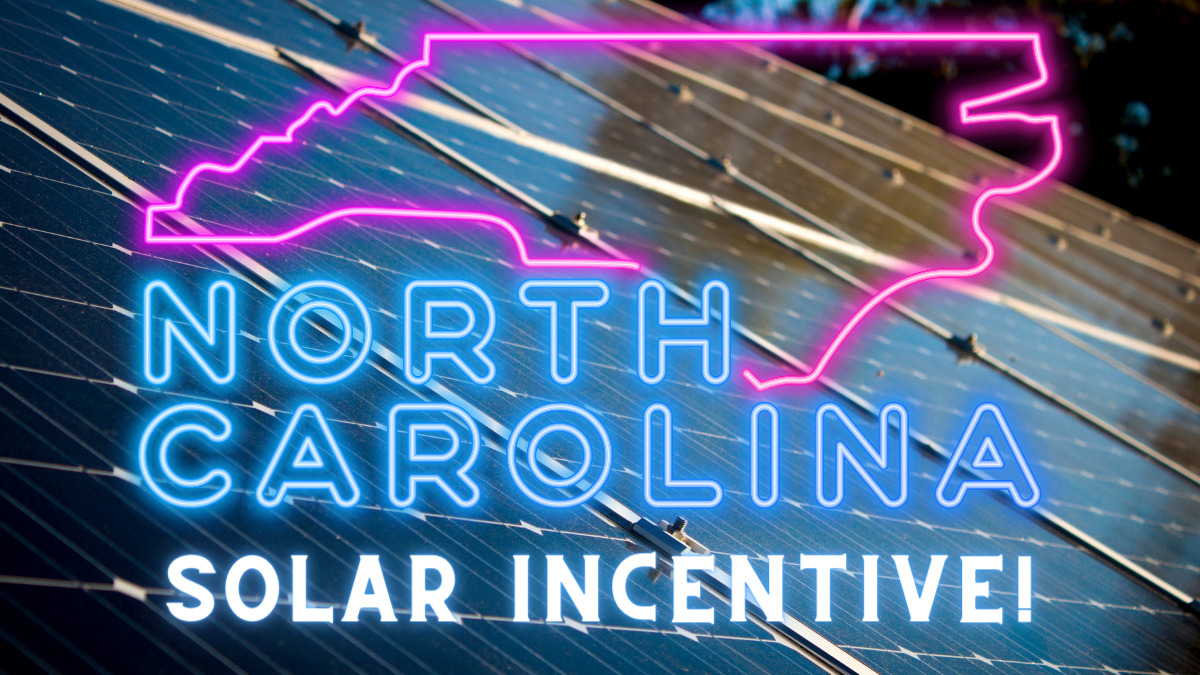Introduction
North Carolina has quickly become a hotspot for solar energy thanks to its diverse range of solar incentives. This means going green became an appealing option for homeowners and businesses.
With federal tax credits, net metering programs, and local rebate options available in the Tar Heel State, investing in clean energy has never been easier or more affordable.
We’ll break down the various North Carolina solar incentives available and guide you through harnessing the power of renewable energy.
Understanding North Carolina’s Solar Incentives
North Carolina offers a range of solar incentives, including federal and state tax credits, net metering programs, and renewable energy credits (RECs), making it an attractive place for homeowners to invest in solar energy.
Federal And State Tax Credits
One of the most attractive incentives for North Carolinians considering solar energy is the availability of federal and state tax credits. On a federal level, homeowners can benefit from the Solar Investment Tax Credit (ITC), which allows them to claim 30% of their solar installation costs through income taxes.
In addition to the ITC, North Carolina residents can also take advantage of state tax credits designed to promote clean energy adoption. For instance, nonprofit organizations are eligible for a generous rebate program to save up to $4,000 or 40 cents per watt on solar panel installation expenses.
Net Metering Program
This incentive allows solar panel owners to receive credit for the excess energy they produce and feed back into the grid. This means that when a residential, commercial, or industrial solar panel system generates more electricity than it consumes, the surplus energy returns to the utility company and gets credited to its account.
Through this program, homeowners with renewable energy systems can reduce their energy bills by offsetting their consumption with credits earned through net metering. North Carolina also provides meter aggregation for its community solar programs so that multiple systems can benefit from net metering.
Renewable Energy Credits (RECs)
Another great solar incentive in North Carolina is the Renewable Energy Credits (RECs) program. This program allows individuals and businesses to earn credits for the renewable energy they produce, which can then be sold or traded on the open market.
Participating in this program can save money on your energy bill and contribute to a more sustainable future by promoting clean energy production.
In fact, many companies have committed to purchasing RECs as part of their sustainability goals.
Other Solar Incentives Available In North Carolina
North Carolina’s solar incentives extend beyond tax credits and net metering, with programs such as Solarize NC offering discounted rates on solar panel installations for groups of homeowners in a particular area.
Solar Rebate Programs

North Carolina offers various solar rebate programs to help homeowners and businesses switch to clean energy. These programs aim to reduce the upfront costs associated with solar panel installation and make it more affordable. Below are some of the solar rebate programs available in North Carolina:
NC Solar Rebate Program:
This program provides rebates of up to $4,000 or 40 cents per watt for residential solar installations. Certain conditions apply, and funds are limited, so a waiting list may exist.
Duke Energy Solar Rebate:
Duke Energy offers a $0.60/Watt ($6,000 maximum) for qualifying North Carolina customers who install a grid-tied solar panel system on their property.
Federal Tax Credit:
North Carolina residents can claim the federal Investment Tax Credit (ITC) for solar panel installation. This program offers up to 30% of the total cost as a tax credit.
Local Utility Company Rebates:
Some utility companies offer incentives like cash rebates or credits for installing solar panels on future bills.
By taking advantage of these rebate programs, homeowners and businesses in North Carolina can reduce energy costs while reducing their carbon footprint.
Solarize Programs
In addition to North Carolina’s solar rebate program, Solarize programs are another available incentive for residents looking to switch to solar energy. These community-based initiatives aim to encourage more individuals and businesses to adopt solar power by offering group discounts on the cost of installation.
Essentially, these programs use bulk purchasing power to lower costs for participants. This not only helps make solar energy more accessible but also creates a sense of community around sustainability efforts.
Property And Sales Tax Exemptions
North Carolina offers property and sales tax exemptions to residents installing solar panels for their homes or businesses. The state does not levy any additional property taxes on the added value of a solar panel system. This means homeowners’ property tax bills will not increase due to the installation.
These exemptions can help make installing a solar panel system more affordable for residents nationwide. With rising electricity costs and increasing environmental concerns, many North Carolinians are considering clean energy options like solar power.
Green Building Incentives

In addition to solar-specific incentives, North Carolina offers green building incentives to encourage environmentally-friendly construction. These incentives vary depending on the city or county but often include reduced permit fees and expedited permitting for projects that meet green building criteria.
For example, commercial buildings that achieve LEED certification in Asheville receive a 50% reduction in permit fees. Similarly, Mecklenburg County provides tax credits for newly constructed or renovated buildings that meet specific sustainability standards such as Energy Star or LEED certification.
Qualifying For North Carolina’s Solar Incentives
To qualify for North Carolina’s solar incentives, individuals must meet equipment and installation standards, meet eligibility criteria, go through the application process and provide the necessary documentation, and work with a certified installer.
Meeting Equipment And Installation Standards
Meeting specific equipment and installation standards is important to qualify for North Carolina’s solar incentives. Here are the requirements to meet when installing solar panels in North Carolina:
- Solar panels must be installed by a certified installer or contractor.
- All solar equipment must be new and UL-listed.
- The system must be compliant with local and state building codes.
- The system must have a warranty of at least five years.
- The solar panel system must be grid-tied and connected to the utility company’s electrical grid.
- The system should meet minimum energy production requirements set by the state or utility provider.
By meeting these equipment and installation standards, homeowners can ensure their solar panel systems operate safely and efficiently while qualifying for various incentives and tax credits available in North Carolina.
Eligibility Criteria
To qualify for North Carolina’s solar incentives, homeowners and organizations must meet certain eligibility criteria. This includes having the correct equipment and installation standards and completing the required application process and documentation.
Additionally, residential customers may be eligible for property tax exemptions if they own their homes and use solar panels to power them. Nonprofit organizations can also take advantage of solar incentives in North Carolina if they meet specific criteria, such as having a valid tax-exempt certificate from the Internal Revenue Service (IRS).
Application Process And Documentation
To qualify for North Carolina’s solar incentives, applicants must complete the application process and provide the necessary documentation. Here are the steps to apply for solar incentives in North Carolina:
- Research available incentives and eligibility requirements.
- Choose a certified installer from the list of approved vendors on the North Carolina Clean Energy Technology Center website.
- Work with the chosen installer to assess your property’s solar potential and develop a system design.
- If applicable, apply to the NC Utilities Commission or your utility company.
- Provide copies of required documents such as proof of system ownership, installation invoices, and federal tax forms.
- Wait for approval from the relevant agency or utility company.
Remember that each incentive program may have different application requirements, so carefully review specific guidelines before applying. Staying current on current regulations and policies is important. Remember that North Carolina’s solar incentives and tax credits may change.
Working With A Certified Installer
To qualify for North Carolina’s solar incentives, it’s important to work with a certified installer who can ensure that your solar panel system meets the required equipment and installation standards.
A certified installer’s expertise ensures that your installation will be effective and efficient, helping you achieve maximum energy production and savings. It also assures you of the quality. One of the biggest advantages of going solar in North Carolina is the opportunity to reduce upfront costs. With state and federal tax credits, homeowners can receive significant discounts on their solar panel installation.
In addition, some local utility companies offer free or discounted installation programs, further reducing expenses. For example, Duke Energy provides a free system to eligible customers through its Solar Rebate Program.
Increased Return On Investment

Investing in solar panels can lead to significant savings on your energy bills and an increased return on investment (ROI). By generating your own clean energy, you’ll become less reliant on traditional power sources subject to price fluctuations.
Additionally, the federal government offers a Solar Investment Tax Credit (ITC), allowing homeowners to deduct up to 30% of the cost of their solar panel system from their taxes.
North Carolina also has its own set of incentives for residential solar customers that offer rebates and performance payments that add up over time. With these incentives combined, homeowners who invest in a solar panel system could see their initial investment pay off within a few years while enjoying years of free electricity afterward.
Enhanced Energy Independence
One significant benefit of going solar in North Carolina is its enhanced energy independence. By generating electricity through a solar panel system, you become less reliant on traditional coal and natural gas sources.
Moreover, with net metering programs in North Carolina, you can sell excess energy generated by your solar panels back to the grid, increasing your self-sufficiency and financial savings.
Positive Environmental Impact
Going solar in North Carolina not only benefits homeowners financially but it also has a positive environmental impact. Solar power is a clean and renewable source of energy that reduces the carbon footprint associated with electricity production.
By using solar panels instead of traditional fossil fuels, homeowners can prevent the emission of harmful greenhouse gases into the atmosphere. In fact, installing a 5kW solar panel system in North Carolina can reduce carbon emissions by approximately 7,000 pounds each year.
Additionally, going solar contributes to cleaner air and water for local communities and helps combat climate change globally.
Ability To Participate In Community Solar Programs
Another advantage of going solar in North Carolina is participating in community solar programs. These programs offer a solution for those who cannot or prefer not to install solar panels on their property.
Instead, they can invest in shared solar projects located off-site and receive credits on their electric bills for the energy generated by these projects. This allows more people to access the benefits of solar energy without worrying about installation costs or property restrictions.
Conclusion
In conclusion, North Carolina provides several solar incentives to encourage homeowners and businesses to switch to renewable energy sources. From federal tax credits and net metering programs to state rebate plans, property tax exemptions, and green building incentives, many options are available for those looking to invest in clean technology.
Going solar reduces upfront costs, increases return on investment, and contributes positively to the environment. It can also help boost energy independence while reducing carbon footprints.
With an increasing demand for sustainable living coupled with rising energy prices, now is the perfect time for interested parties in North Carolina to seize these opportunities and take advantage of these incentive programs before they disappear or change considerably over time.
Additionally, working with an experienced installer means they are familiar with eligibility criteria, the application process, and documentation requirements for accessing North Carolina’s solar incentives.
Their knowledge of incentive programs can help you navigate different options to access all qualifying state tax credits, such as the Net Metering program, or federal tax credits, like Investment Tax Credit (ITC).
Want To Go Solar
If you’re a homeowner or business owner in North Carolina, don’t miss out on the opportunity to switch to renewable energy sources and take advantage of the many solar incentives available. Investing in solar energy can help you save money on energy costs, reduce your carbon footprint, and increase your property value. Act now to secure your spot in these programs before they disappear or change. Contact DroneQuote, an experienced roofing and solar services provider, to learn how we can help you access North Carolina’s solar incentives and start benefiting from clean, sustainable energy today. Sign up here.
FAQs:

- Who is eligible for these incentives?
Both residential and commercial property owners who install qualifying solar systems can be eligible for these incentives.
- How do I apply for North Carolina’s solar incentives?
Applying for North Carolina’s solar incentives typically involves working closely with a licensed installer who will coordinate all necessary paperwork and ensure compliance with relevant regulations.
- Are there any other benefits of installing a solar system beyond these incentives?
Installing a new solar system can help reduce overall energy costs and improve your home or business’ sustainability profile. Additionally, adding a renewable energy source like this may increase your property value over time, making it an even more worthwhile investment in the long run.
